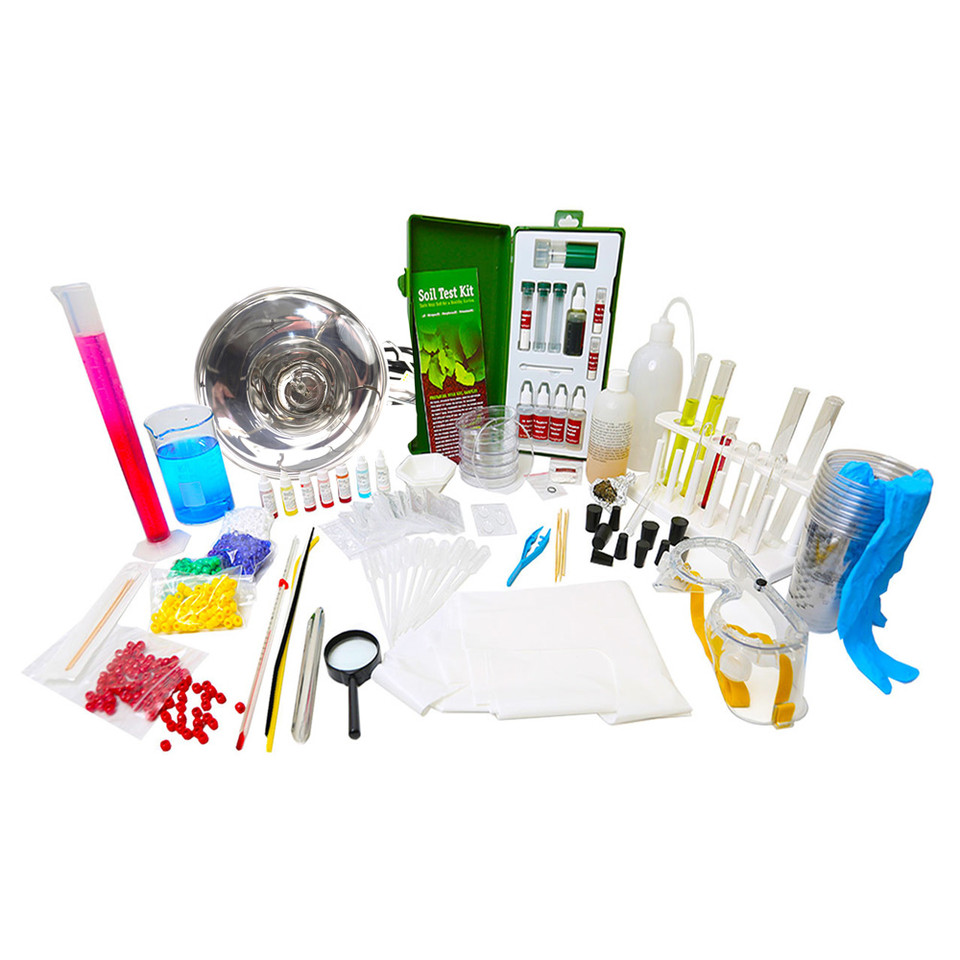Authentic Classical Education with all Timeless Ten© Elements
Live, Online Science Classes
Please select the grade level that you would like to learn about:
Science Kindergarten
Science 1st Grade
Science 2nd Grade
Science 3rd Grade
Science 4th Grade
Science 5th Grade
Science 6th Grade
Science 7th Grade
Science 8th Grade
Science 9th Grade
Science 10th Grade
Science 11th Grade
Science 12th Grade
Live Class Payment in Full
- 5% Payment in Full Discount = $565.25
Live Class Payment Plan
- $59.50/mo for 10 Months
Science Kindergarten
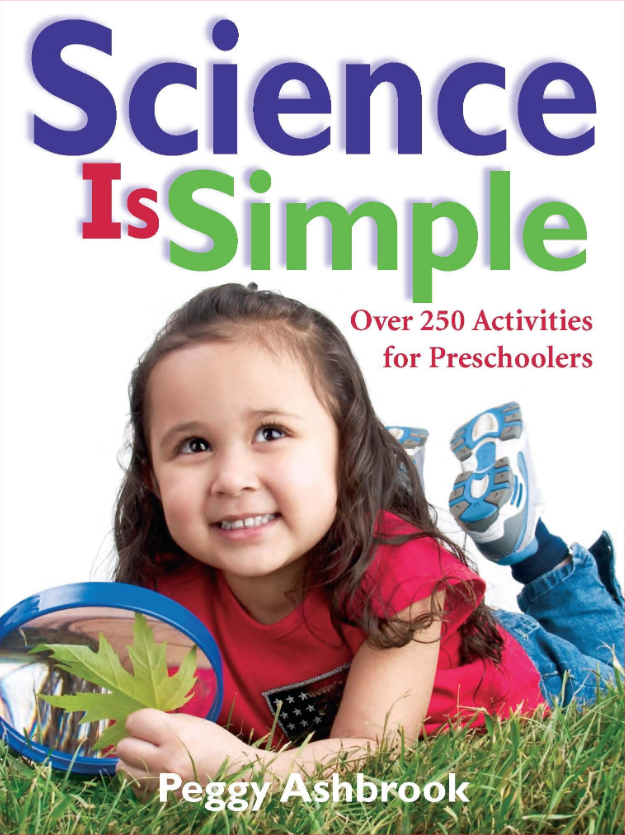
Required Textbook: Science is Simple: Over 250 Activities
The textbook for this course, Science Is Simple, encourages children to experience our world fully. Students will learn about God’s creation with a special emphasis on age-appropriate activities. They will experience science in a fun and simple way that will give them the confidence and desire for future scientific explorations, whether academic or recreational.
Live classes will meet weekly, 30 weeks, beginning the first week of September (see the posted Academic Schedule for holidays) on the same day and time each week, for a one-hour-live class. At that class the tutor will: explain the assignment for the coming week; answer your questions and perhaps pose some; note and address any problems or difficulties noticed in the prior week’s work; and lead a brief discussion of the topic at hand. These are rather informal and friendly live tutoring sessions.
Science 1st Grade
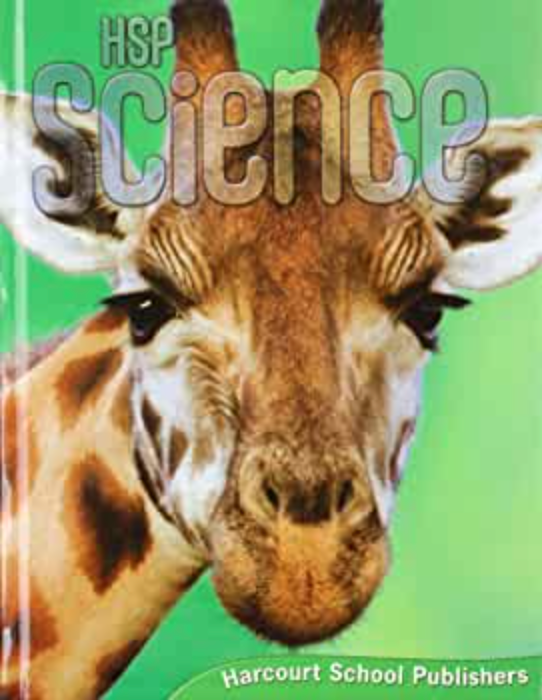 Required Textbook: HSP Science 1st Grade
Required Textbook: HSP Science 1st Grade
In this course, students will begin with an appreciation for how we use our senses to explore and learn about the world around us, helping them to develop the inquiry skills needed for their journey into science. Embarking on a study of living things, students will then come to know how animals and plants are grouped, how they grow, and the environments in which they live. Following this will come a journey into Earth science, including forests, deserts, oceans, water, weather, and seasons. Students will learn about the moon and other objects visible in the night sky before turning to an exploration of matter, energy, light, sound, motion, gravity, and magnetic force.
These live classes will meet weekly for 30 weeks, beginning the first week of September (please see the posted Academic Calendar for holidays) on the same day and time each week for a one-hour live class. At each class, the tutor will: lead a brief discussion on the reading for the week; explain the assignment for the coming week; and answer any questions or concerns the students may have from the previous week’s lesson. These classes are designed to be somewhat informal and friendly live tutoring sessions.
Science 2nd Grade
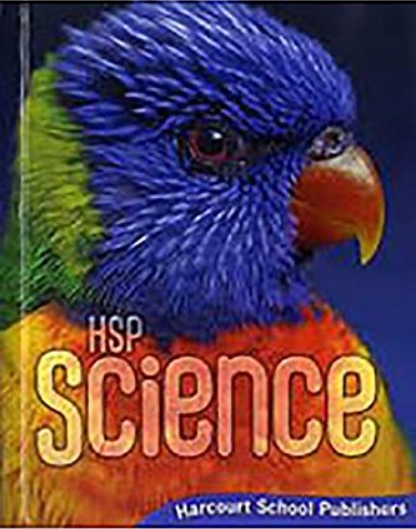
Required Textbook: HSP Science 2nd Grade
In this course, students will explore how scientists work and the tools they use before setting out on a discovery of plant and animal life. This will include the life cycles of plants and animals, as well as an exploration of food chains and food webs. Following this, students will discover the Earth around us, especially rocks, sand, soil, and many kinds of natural resources. They will navigate the solar system and the moon before turning to weather, the seasons, and the water cycle. Students will also explore the various forms of matter and how matter changes, as well as energy, light, heat, sound, and motion.
These live classes will meet weekly for 30 weeks, beginning the first week of September (please see the posted Academic Calendar for holidays) on the same day and time each week for a one-hour live class. At each class, the tutor will: lead a brief discussion on the reading for the week; explain the assignment for the coming week; and answer any questions or concerns the students may have from the previous week’s lesson. These classes are designed to be somewhat informal and friendly live tutoring sessions.
Science 3rd Grade
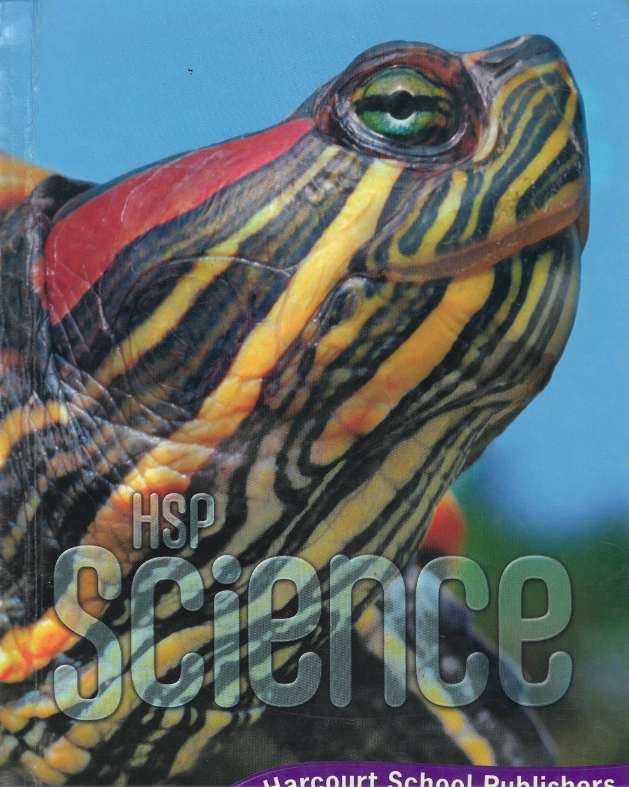 Required Textbook: HSP Science 3rd Grade
Required Textbook: HSP Science 3rd Grade
In this course, students will embark on a discovery of the tools and skills of science and will be introduced to the scientific method. They will learn about different kinds of animals and plants and what animals and plants need to live, along with ecosystems and the ways in which living things depend on each other. Following this, the students will explore the Earth around us and its features, including land, rocks, soil, natural resources, and weather. Students will also be introduced to the solar system and to the interaction between the Earth and the moon. The course will then journey into fundamental principles of science such as matter and its states, energy and its uses, and also heat, light and sound. Forces, motion, waves, work, and simple machines will be still further areas into which students will continue their scientific adventures.
These live classes will meet weekly for 30 weeks, beginning the first week of September (please see the posted Academic Calendar for holidays) on the same day and time each week for a one-hour live class. At each class, the tutor will: lead a brief discussion on the reading for the week; explain the assignment for the coming week; and answer any questions or concerns the students may have from the previous week’s lesson. These classes are designed to be somewhat informal and friendly live tutoring sessions.
Science 4th Grade
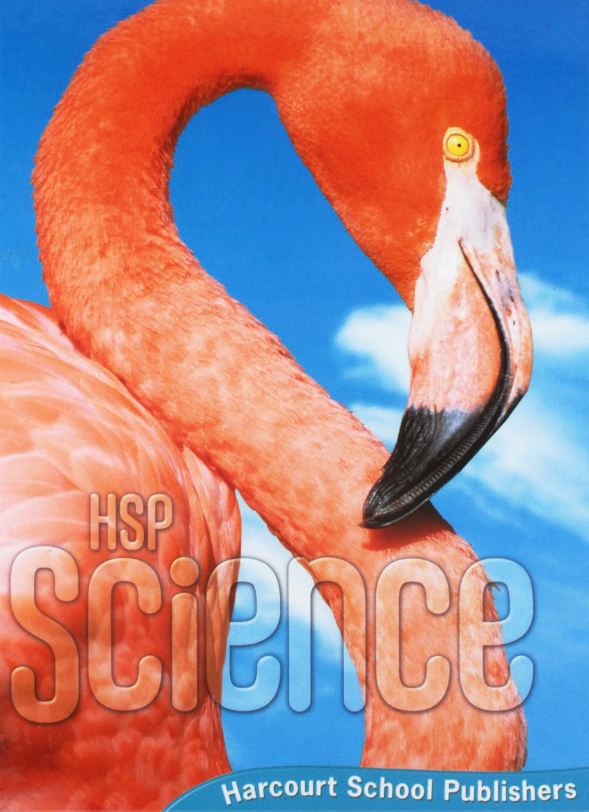 Required Textbook: HSP Science 4th Grade
Required Textbook: HSP Science 4th Grade
In this course, students will appreciate the scientific method while becoming further acquainted with the tools and skills of scientific inquiry. They will dive into the world of living things and will discover the life cycles of plants and animals, as well as the ways in which scientists classify plant and animal life. The human body will also be studied, along with the ways in which human beings think and move. After visiting various ecosystems, students will explore soil, rock, fossils, and the water cycle as they study the Earth’s surface. From Earth they will journey briefly into outer space, becoming familiar with the planets. Next to be explored are matter, the properties of matter, and chemical reactions, along with light, heat, electricity, and magnetism. The course will also give students experience with a number of the basic concepts of Physics, including force, motion, acceleration, gravity, and simple machines.
These live classes will meet weekly for 30 weeks, beginning the first week of September (please see the posted Academic Calendar for holidays) on the same day and time each week for a one-hour live class. At each class, the tutor will: lead a brief discussion on the reading for the week; explain the assignment for the coming week; and answer any questions or concerns the students may have from the previous week’s lesson. These classes are designed to be somewhat informal and friendly live tutoring sessions.
Science 5th Grade
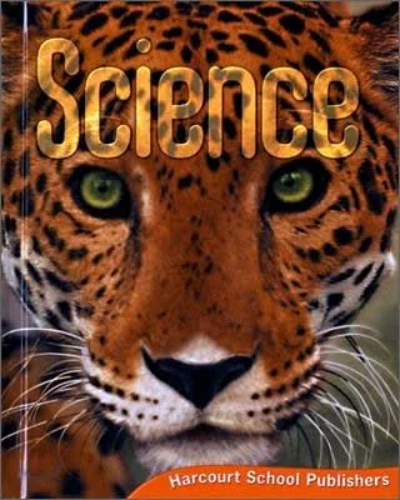 Required Textbook: HSP Science 5th Grade
Required Textbook: HSP Science 5th Grade
In this course, students will expand their knowledge of the scientific method and the skills of scientific inquiry before diving into fundamental biology, including the study of cells and how they work together, along with the various body systems. Students will discover the differences between vertebrates and invertebrates and will become familiar with growth, reproduction, and heredity in living things, while also learning about ecosystems. Following this will be a journey into Earth science and a wide range of fascinating areas, including rock formation, fossils, the movement of the earth’s crust, minerals, and natural resources. Students will also learn about weather and its cycles and patterns, as well as the oceans and the movement of their waters. From the Earth, this journey will soar upwards into the midst of the solar system and the stars above, as well as to the moon and its interactions with the Earth. Still further areas of fundamental science will be explored, including the structure of matter, physical properties and changes, chemical properties, heat transfer, electricity, sound and light, and a number of aspects of Physics such as forces, work, and the laws of motion.
These live classes will meet weekly for 30 weeks, beginning the first week of September (please see the posted Academic Calendar for holidays) on the same day and time each week for a one-hour live class. At each class, the tutor will: lead a brief discussion on the reading for the week; explain the assignment for the coming week; and answer any questions or concerns the students may have from the previous week’s lesson. These classes are designed to be somewhat informal and friendly live tutoring sessions.
Science 6th Grade
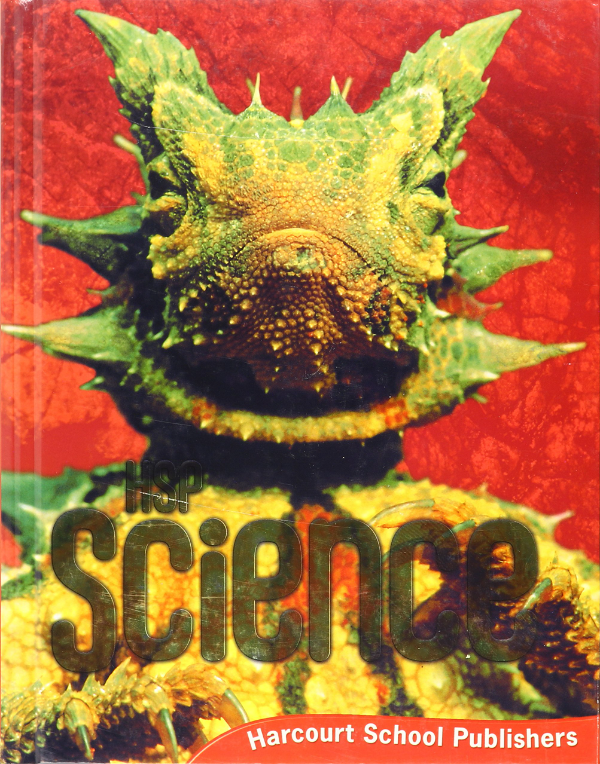 Required Textbook: HSP Science 6th Grade
Required Textbook: HSP Science 6th Grade
In this course, students will continue to grow in their understanding of the scientific method and of the skills and tools which scientists use in their inquiries. They will explore cells and cell reproduction, heredity, natural selection, and the naming and classification of living organisms. Attention will be given to the world of plants, especially the ways in which plants survive, reproduce, and respond to their environments. As students learn about ecosystems, they will discover the many ways in which organisms get energy and interact, as well as the resources within an ecosystem and how ecosystems can undergo change. From this point, they will embark on a journey into Earth science, learning about earthquakes and volcanoes, soil, fossils, the different kinds of rock, and the movement of tectonic plates. The journey will voyage into the ocean and will touch upon the living things for which the ocean is a home. The adventure will even go to outer space, where students will discover lunar phases, our solar system, and the vastness which lies beyond. Indeed, students will learn not only about the vastness of space, but also about atoms, elements, compounds, and the states, changes, and chemical properties of matter. They will also explore energy, waves, light, heat, and electricity. Several fundamental aspects of Physics, including gravity, motion, and forces, as well as interactions between forces, will comprise the conclusion of this scientific adventure.
These live classes will meet weekly for 30 weeks, beginning the first week of September (please see the posted Academic Calendar for holidays) on the same day and time each week for a one-hour live class. At each class, the tutor will: lead a brief discussion on the reading for the week; explain the assignment for the coming week; and answer any questions or concerns the students may have from the previous week’s lesson. These classes are designed to be somewhat informal and friendly live tutoring sessions.
Science 7th Grade – Earth Science
Required Textbook: Novare Earth Science
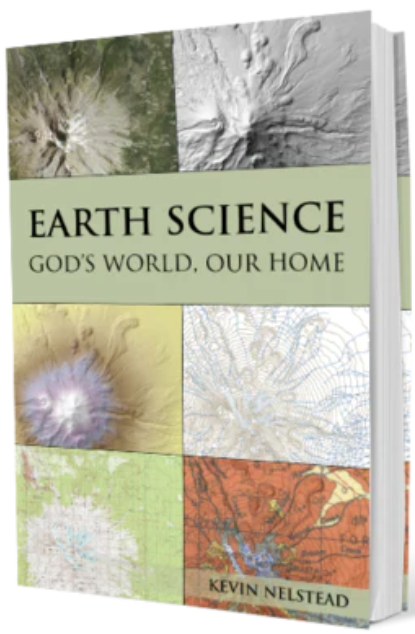 The world that God created is a place of wonder and beauty, a mystery to be contemplated rather than just a problem to be solved. Every aspect of creation is a new source of awe and inspiration. The human pursuit of science is the endeavor to uncover the hidden order and intelligibility of all aspects of the physical world.
The world that God created is a place of wonder and beauty, a mystery to be contemplated rather than just a problem to be solved. Every aspect of creation is a new source of awe and inspiration. The human pursuit of science is the endeavor to uncover the hidden order and intelligibility of all aspects of the physical world.
Based on the Catholic Textbook Project textbook: Earth Science: God’s World, Our Home, 2nd edition. This textbook includes vibrant graphics, lucid conversational prose, and an approach that connects students with real-world science as stewards of God’s creation. Author Kevin Nelstead regularly draws the reader to appreciate the intricacy and excellence of God’s works, while integrating relevant subjects where possible to help the student achieve a full vision of creation. This text includes learning objectives at the beginning of each chapter, learning checks along the way to review what has been covered, and exercises at the end of each chapter to keep students on track with the material.
Live classes will meet weekly, 30 weeks, beginning the first week of September (see the posted Academic Schedule for holidays) on the same day and time each week, for a one-hour-live class. During class, the tutor will: explain the assignment for the coming week; answer your questions and perhaps pose some; note and address any problems or difficulties noticed in the prior week’s work; and lead a brief discussion of the topic at hand. These are rather informal and friendly live tutoring sessions.
Science 8th Grade – Physical Science
Required Textbook: Novare Physical Science by John D. Mays
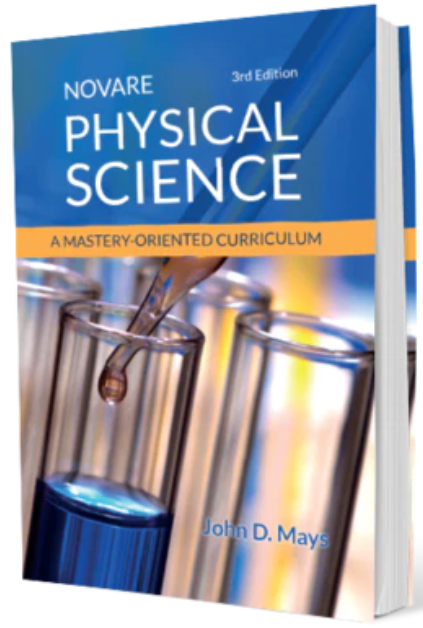 The world that God created is a place of wonder and beauty, a mystery to be contemplated rather than just a problem to be solved. Every aspect of creation is a new source of awe and inspiration. The human pursuit of science is the endeavor to uncover the hidden order and intelligibility of all aspects of the physical world.
The world that God created is a place of wonder and beauty, a mystery to be contemplated rather than just a problem to be solved. Every aspect of creation is a new source of awe and inspiration. The human pursuit of science is the endeavor to uncover the hidden order and intelligibility of all aspects of the physical world.
Based on the Catholic Textbook Project textbook, the Novare Physical Science textbook is designed for grades 6-8, Novare Physical Science is beautiful inside and out. With a mature, developed sense of aesthetics, this book is tidy and attractive. Each chapter begins with a list of quantifiable learning objectives and important vocabulary and includes periodic learning checks to provide a moment to stop and review. Students love the personal style of the narrative in which the author concisely and accurately explains the concepts with evident wonder and excitement at the marvels of God’s world.
Live classes will meet weekly, 30 weeks, beginning the first week of September (see the posted Academic Schedule for holidays) on the same day and time each week, for a one-hour-live class.
During class, the tutor will: explain the assignment for the coming week; answer your questions and perhaps pose some; note and address any problems or difficulties noticed in the prior week’s work; and lead a brief discussion of the topic at hand. These are rather informal and friendly live tutoring sessions.
Science 9th Grade – Biology
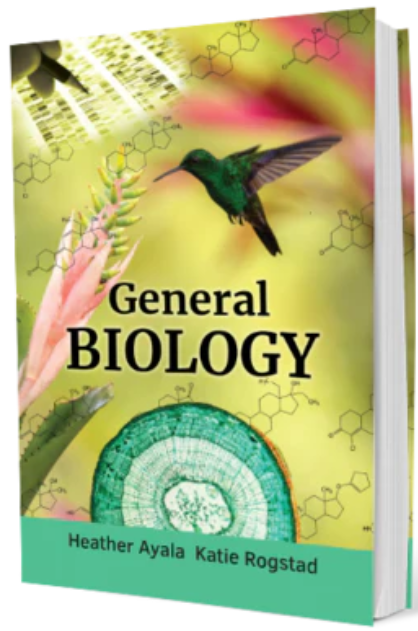 Required Textbooks:
Required Textbooks:
- General Biology by Ayala and Rogstad
- Chance or Purpose? Creation, Evolution and a Rational Faith by Cardinal Schonborn
The textbook is from the Catholic Textbook Project: General Biology by Ayala and Rogstad is a pleasure to read, succinctly and lucidly covering a wide array of information in a modest number of pages. Features include learning objectives at the beginning of every chapter, exercises that call for both clear articulations of thoughts and full-sentence answers, and an organization of topics that steadily builds chapter by chapter. The book starts at the atomic level and progresses to ever larger scales: cells, genes, microorganisms, plants, animals, and human organ systems. This work propels students not only to learn but to substantially retain the content for years after completing the course.
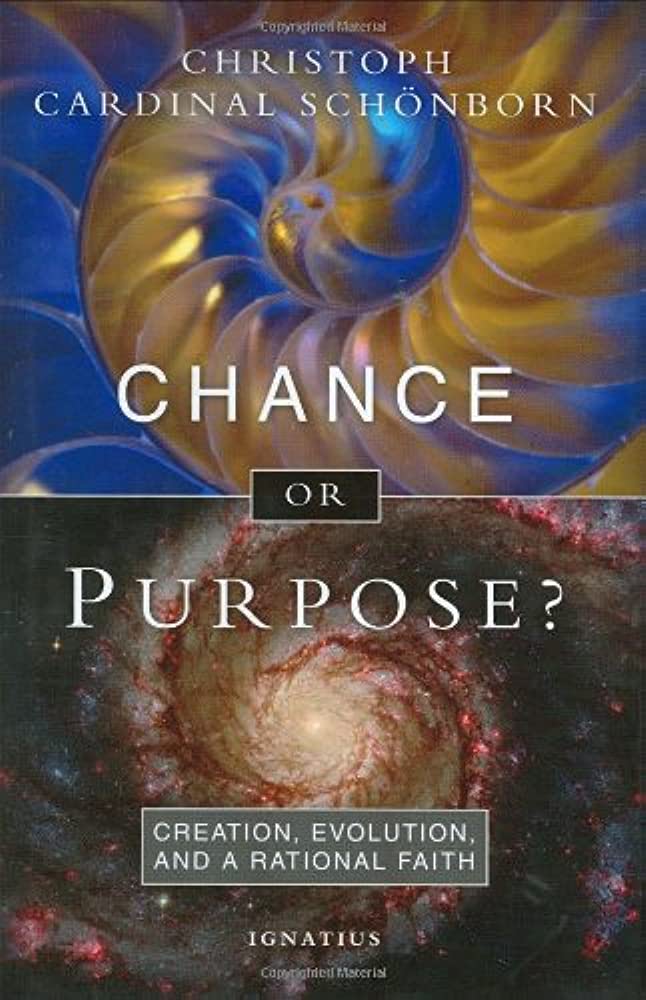 This book succinctly covers a wide array of information in a modest number of pages. Features include learning objectives at the beginning of every chapter, exercises that call for clear articulations of thoughts, full-sentence answers, and an organization of topics that steadily builds chapter by chapter. The book starts at the atomic level and progresses to ever larger scales: cells, genes, microorganisms, plants, animals, and human organ systems.
This book succinctly covers a wide array of information in a modest number of pages. Features include learning objectives at the beginning of every chapter, exercises that call for clear articulations of thoughts, full-sentence answers, and an organization of topics that steadily builds chapter by chapter. The book starts at the atomic level and progresses to ever larger scales: cells, genes, microorganisms, plants, animals, and human organ systems.
Students will also study Chance or Purpose by Cardinal Christoph Schonborn. In this book, Cardinal Schonborn tackles hard questions with a carefully reasoned “theology of creation.” Can we still speak intelligently of the world as “creation” and affirm the existence of the Creator, or is God just a “delusion?” How should an informed believer read Genesis? If God exists, why is there so much injustice and suffering? Are human beings a part of nature or elevated above it? What is man’s destiny? Is everything a matter of chance or can we discern purpose in human existence?
Live classes will meet weekly, for 30 weeks, beginning the first week of September 9 (see the posted Academic Schedule for holidays) on the same day and time each week, for a one-hour-live class. At that class the tutor will: explain the assignment for the coming week; answer your questions and perhaps pose some; note and address any problems or difficulties noticed in the prior week’s work; and lead a brief discussion of the topic at hand. These are rather informal and friendly live tutoring sessions.
Science 9th Grade – Biology LAB
- Novare General Biology Lab Kit
- The Apprentice’s Companion for General Biology
- Microscope
The Novare General Biology Lab Kit is designed around The Apprentice’s Companion to General Biology by Novare. It contains the hard to find items like test tubes, stopper, Nutrient Agar, and pipets required to complete the designed experiments.
Live classes will meet weekly, for 30 weeks, beginning the first week of September 9 (see the posted Academic Schedule for holidays) on the same day and time each week, for a one-hour-live class. At that class the tutor will: explain the assignment for the coming week; answer your questions and perhaps pose some; note and address any problems or difficulties noticed in the prior week’s work; and lead a brief discussion of the topic at hand. These are rather informal and friendly live tutoring sessions.
 Designed to accompany General Biology, The Apprentice’s Companion for General Biology is an exciting and valuable new combination of experiment book, field manual, and commonplace book. Throughout the book, students are prompted to form hypotheses, take data, and revisit those hypotheses to assess, wherever possible, if they are supported by the data. Enhanced with images of art, poems, and quotes by respected scientists and naturalists, each chapter contains:
Designed to accompany General Biology, The Apprentice’s Companion for General Biology is an exciting and valuable new combination of experiment book, field manual, and commonplace book. Throughout the book, students are prompted to form hypotheses, take data, and revisit those hypotheses to assess, wherever possible, if they are supported by the data. Enhanced with images of art, poems, and quotes by respected scientists and naturalists, each chapter contains:
- Multiple experiments and lab activities, some taking approximately 15 minutes and others occupying a class period or more
- Experiment procedures
- Space for sketches, draft and final graphs, and data and data tables
- Room for writing down thoughts and interacting with questions
The use of everyday materials is maximized so that overall costs associated with the experiments are manageable. For example, in an experiment on osmosis, eggs (instead of the customary dialysis tubing) are used.
 Students will also need a microscope. Novare’s materials list identifies a $300.00 or more Home Science Tools: MI-4100LST, but we have found several microscopes in the range of $89 to $129 that will work just as well. For example, the PalliPartners Compound Microscope, 100X-2000X comes with Microscope Slides Set, and phone adapter. It offers 6 magnification settings, 100X, 250X, 1000X, 200X, 500X, 2000X; coarse and fine focus; dual illumination; 15 slides for lab class study, and carrying bag.
Students will also need a microscope. Novare’s materials list identifies a $300.00 or more Home Science Tools: MI-4100LST, but we have found several microscopes in the range of $89 to $129 that will work just as well. For example, the PalliPartners Compound Microscope, 100X-2000X comes with Microscope Slides Set, and phone adapter. It offers 6 magnification settings, 100X, 250X, 1000X, 200X, 500X, 2000X; coarse and fine focus; dual illumination; 15 slides for lab class study, and carrying bag.
Another example is the $89 dollar BEBANG Monocular Microscope for Adults Students, 40X-2000X Magnification, Dual LEDs with Science Kits, Phone Adapter, Carrying Case, AC Adapter, and 15 Slides for lab class study.
Science 10th Grade – Chemistry
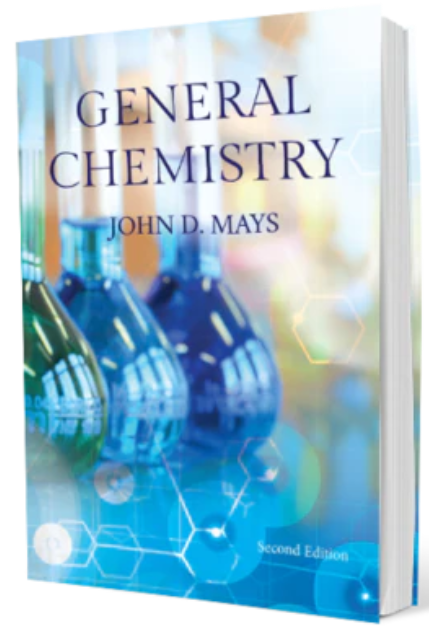 Required Textbook & Materials:
Required Textbook & Materials:
- General Chemistry by John D. Mays, 3rd Edition
- Texas Instrument Scientific Notation Calculator for problem solving (Please make sure that you have a calculator that uses scientific notation for problem solving. Avoid Casio Scientific Calculators as they are noted for glitches in scientific notation as explained in the General Chemistry textbook).
Students need basic algebra knowledge for this course. This textbook from the Catholic Textbook Project uses a mastery-learning method, in which students build comprehension by adding new concepts while also reviewing and rehearsing key material throughout the year. This method is implemented in carefully crafted exercises and quizzes that facilitate learning, mastery, and retention. The text uses information about the great scientists who came before to enhance students’ knowledge of the scientific enterprise as a whole.
What is Chemistry All About? This text uses information about the great scientists who came before to enhance students’ knowledge of the scientific enterprise as a whole including:
- Measurements (Science and Measurements, Converting Units of Measure, Accuracy and Precision, Other important Math Skills).
- Atoms and Substances (Atoms and Substances, Atoms and Molecules, Types of Substances, Isotopes and Atomic Masses, Density and Quantity of Substances).
- Atomic Structure (Atomic Spectra, The Bohr Model of the Atom, The Quantum Model of the Atom, Electron Configurations, Empirical Formulas).
- The Periodic Law (The Periodic Table of the Elements, Periodic Table Nomenclature, Periodic Physical Properties, Chemical Properties, A Few Notes About Hydrogen).
- Bonding (Preliminaries, Ionic Bonding, Covalent Bonding, Electronegativity, Polarity, and Bond Character).
- Molecular Theory and Metallic Bonding (Molecular Structure, Metallic Bonding, Intermolecular Forces).
- Chemical Reactions and Stoichiometry (Introduction to Chemical Equations, General Types of Chemical Reactions, Stoichiometry).
- Kinetic Theory and States of Matter (Temperature, Kinetic-Molecular Theory, and Pressure, States of Matter).
- The Gas Laws (Early Formulations of the Gas Laws, The Ideal Gas Law, The Law of Partial Pressures, Stoichiometry of Gases and Effusion).
- Solution Chemistry (Dissolution, Solubility, Quantifying Solution Concentration, Compounds in Aqueous Solution, Colligative Properties of Solutions).
- Acids and Bases (Properties and Nomenclature of Acids and Bases, Acid-Base Theories, Aqueous Solutions, and pH).
- Redox Chemistry (Oxidation and Reduction, Redox Reaction Equations, Electrochemistry).
Science 10th Grade – Chemistry LAB
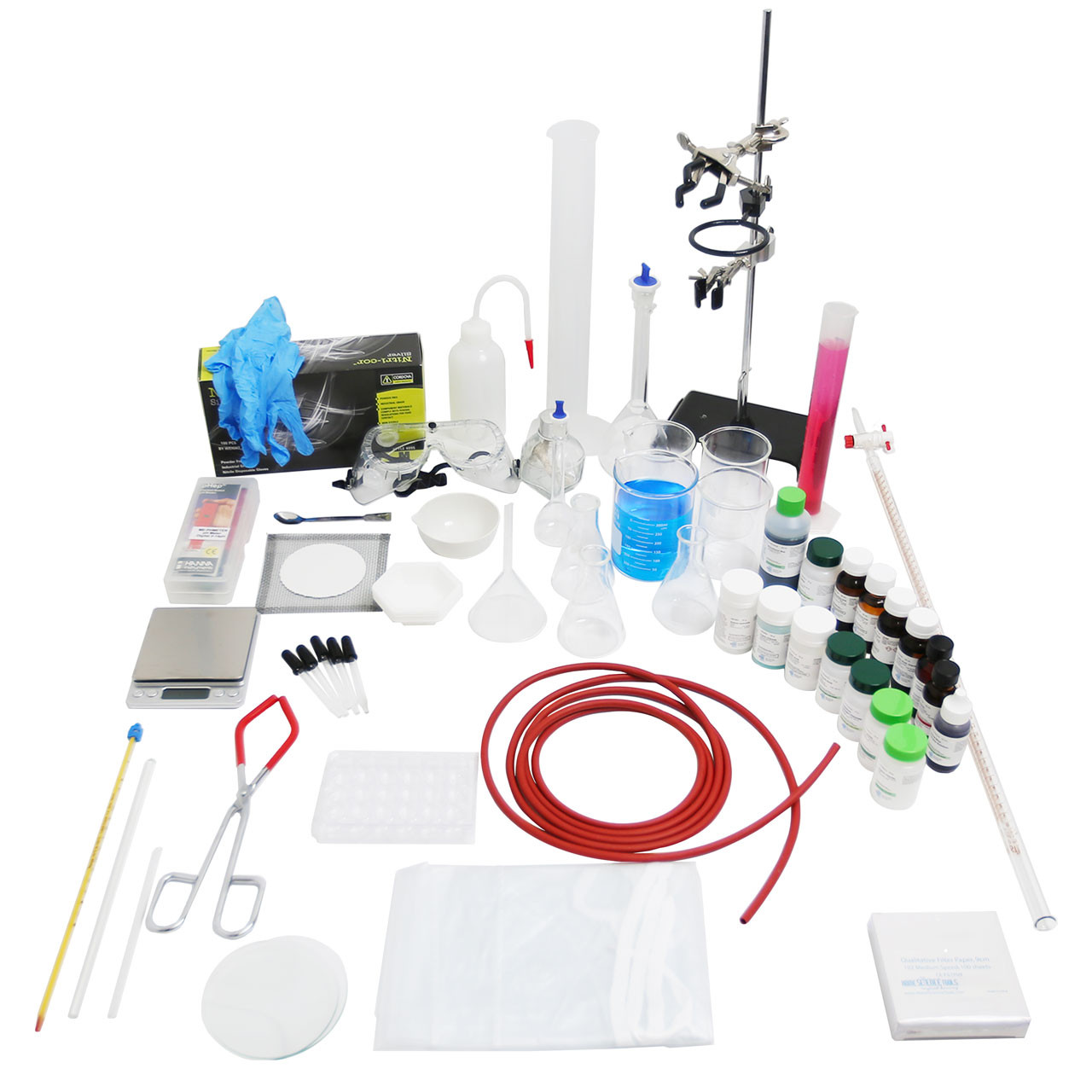 Required: Novare Economy Core Chemistry Lab Kit
Required: Novare Economy Core Chemistry Lab Kit
Contains materials to complete the economy core recommended experiments in the Novare Chemistry Experiments for High School at Home.
Live classes will meet weekly, 30 weeks, beginning the first week of September (see the posted Academic Schedule for holidays) on the same day and time each week, for a one-hour-live class. During class, the tutor will: explain the assignment for the coming week; answer your questions and perhaps pose some; note and address any problems or difficulties noticed in the prior week’s work; and lead a brief discussion of the topic at hand. These are rather informal and friendly live tutoring sessions.
Science 11th Grade – Physics
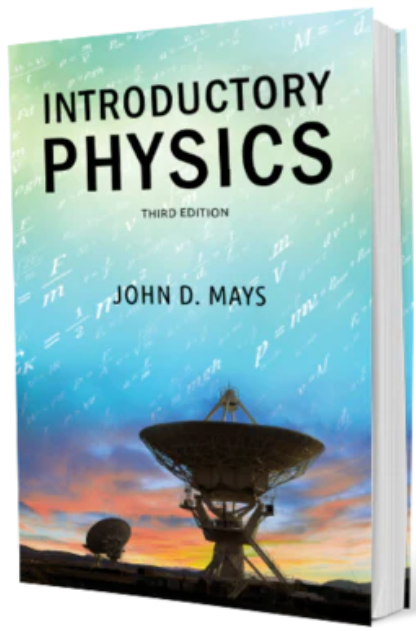 Required Textbook: Introductory Physics. 3rd Edition by John D. Mays
Required Textbook: Introductory Physics. 3rd Edition by John D. Mays
The textbook is from the Catholic Textbook Project – Introductory Physics. 3rd Edition by John D. Mays is ideal for the “physics first” high school science program. This work includes many foundational skills needed for chemistry and biology studies. The book is designed to accompany introductory courses in algebra, and the exercises require students to utilize multiple concepts and skills to arrive at an answer. This text breaks the “cram-pass-forget cycle” by promoting long-term retention of course content. Its beauty lies in the beautiful, relevant color graphics throughout as well as prose that is accurate, lucid, and concise.
The world that God created is a place of wonder and beauty, a mystery to be contemplated rather than just a problem to be solved. Every aspect of creation is a new source of awe and inspiration. The human pursuit of science is the endeavor to uncover the hidden order and intelligibility of all aspects of the physical world.
This course is a conceptual approach to most of the major topics of physics including kinematics, dynamics, energy, momentum, gravitation, circular motion, electrical forces, and wave mechanics. Some algebra skills are required.
Live classes will meet weekly, 30 weeks, beginning the first week of September (see the posted Academic Schedule for holidays) on the same day and time each week, for a one-hour-live class. During class, the tutor will: explain the assignment for the coming week; answer your questions and perhaps pose some; note and address any problems or difficulties noticed in the prior week’s work; and lead a brief discussion of the topic at hand. These are rather informal and friendly live tutoring sessions.
Science 11th Grade – Physics LAB
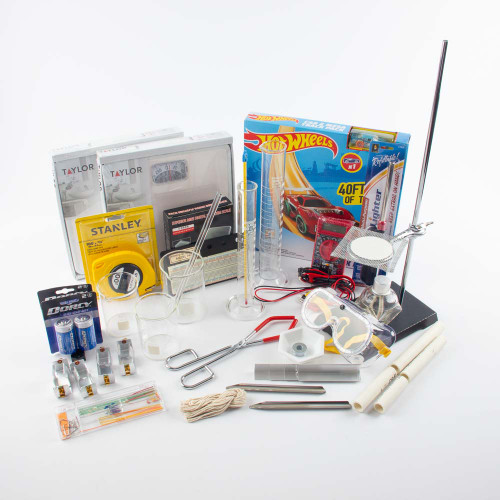 Required: Novare Introductory Physics Kit
Required: Novare Introductory Physics Kit
Save time and energy with this all-in-one science kit! Contains materials for performing the experiments in the Novare Introductory Physics curriculum.
Live classes will meet weekly, 30 weeks, beginning the first week of September (see the posted Academic Schedule for holidays) on the same day and time each week, for a one-hour-live class. During class, the tutor will: explain the assignment for the coming week; answer your questions and perhaps pose some; note and address any problems or difficulties noticed in the prior week’s work; and lead a brief discussion of the topic at hand. These are rather informal and friendly live tutoring sessions.
Science 12th Grade – Advanced Physics
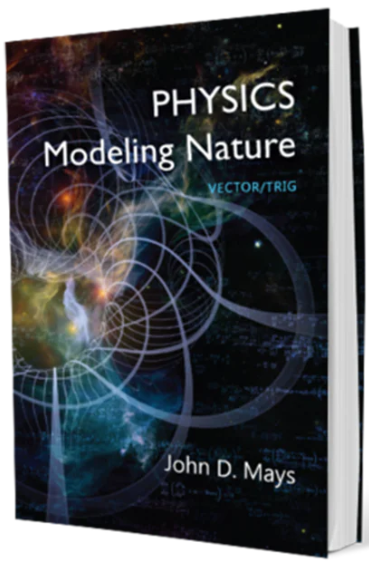 Required Textbook: Physics: Modeling Nature by John D. Mays
Required Textbook: Physics: Modeling Nature by John D. Mays
The textbook is from the Catholic Textbook project and is especially suited to STEM programs with a college-preparatory mission. Modeling Nature employs vector calculations and assumes students have completed trigonometry as a prerequisite. Each chapter includes plenty of exercises and clearly defined learning objectives. Students who aspire to a technical career will find this book to be the best text available with fresh, elucidating illustrations and a narrative that explains concepts with attention to detail. The world that God created is a place of wonder and beauty, a mystery to be contemplated rather than just a problem to be solved. Every aspect of creation is a new source of awe and inspiration.
The human pursuit of science is the endeavor to uncover the hidden order and intelligibility of all aspects of the physical world.
This course is a rigorous mathematical approach to most of the major topics of physics including kinematics, dynamics, energy, momentum, gravitation, circular motion, electrical forces, and wave mechanics. Skills from Algebra, Geometry and Trigonometry are required.
Live classes will meet weekly, 30 weeks, beginning the first week of September (see the posted Academic Schedule for holidays) on the same day and time each week, for a one-hour-live class. During class, the tutor will: explain the assignment for the coming week; answer your questions and perhaps pose some; note and address any problems or difficulties noticed in the prior week’s work; and lead a brief discussion of the topic at hand. These are rather informal and friendly live tutoring sessions.
Science 12th Grade – Advanced Physics LAB
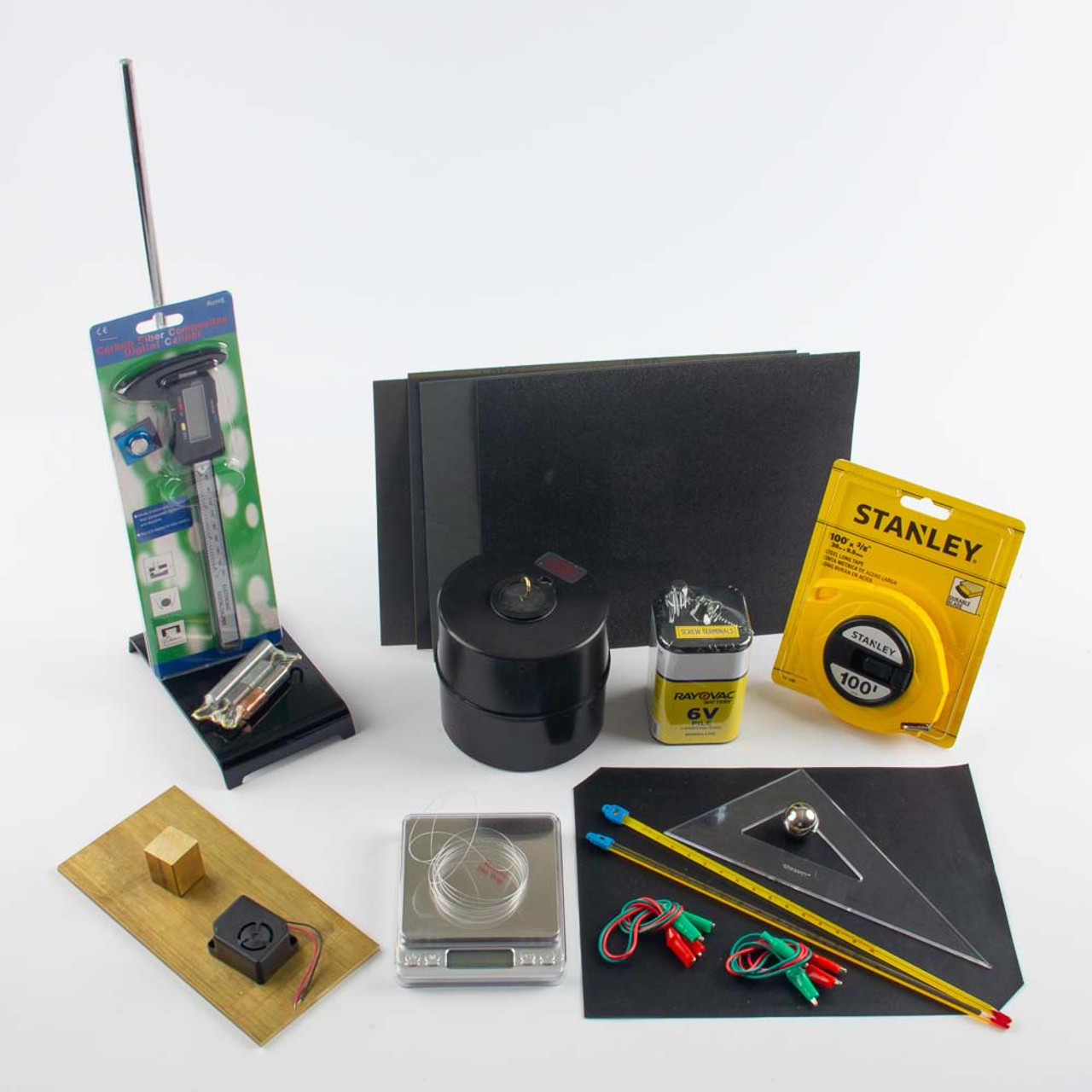 Required: Novare Physics: Modeling Nature Lab Kit
Required: Novare Physics: Modeling Nature Lab Kit
The Save time & energy with this all-in-one science kit! Contains 17 items for doing the labs in the Novare Physics: Modeling Nature curriculum, and allows you to focus your time on learning rather than scrambling for supplies.
Live classes will meet weekly, 30 weeks, beginning the first week of September (see the posted Academic Schedule for holidays) on the same day and time each week, for a one-hour-live class. During class, the tutor will: explain the assignment for the coming week; answer your questions and perhaps pose some; note and address any problems or difficulties noticed in the prior week’s work; and lead a brief discussion of the topic at hand. These are rather informal and friendly live tutoring sessions.

